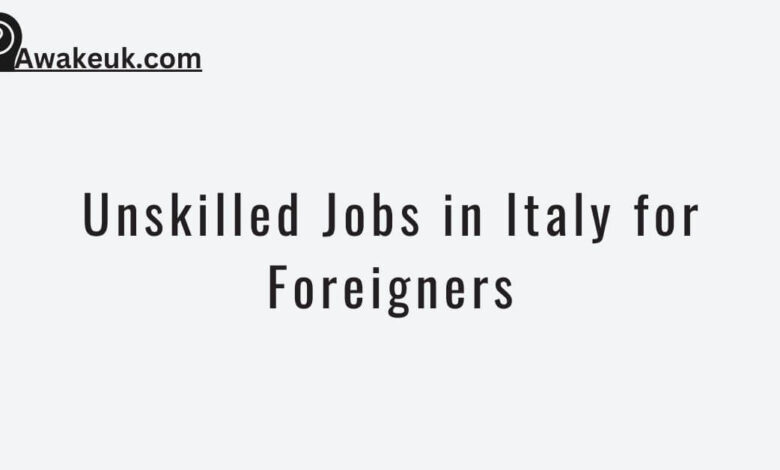Unskilled Jobs in Italy for Foreigners 2024 – Visa Sponsorship

Italy is one of the most attractive EU nations in terms of its labor force and tourist attractions. It is not surprising that it attracts so many international visitors. Therefore, if you have questions about unskilled jobs in Italy, we have the answers you seek.
Italy is a popular tourist and expat destination known for its beautiful language, cuisine, culture, and scenery. Numerous individuals fantasize about relocating to Italy, beginning a new life, and seeking employment.
However, one concern of job seekers contemplating a move to Italy is whether or not there are sufficient unskilled jobs for foreigners.
In this article, we will examine the unskilled jobs available in Italy, as well as the requirements and documents needed to work in Italy as a foreigner.
Unskilled Jobs Description:
Unskilled jobs are those that require minimal experience or technical expertise. These jobs can also be referred to as manual labor. Furthermore, these jobs require physical strength and manual dexterity and are essential to a particular industry.
Thus, janitors, warehouse workers, pickers and packers, and vegetable sorters are typical examples of unskilled jobs in Italy. These positions require good physical health, a diligent work ethic, and the capacity to work with one’s hands. Let’s continue this discussion in the following section.
Category of Top 20 Unskilled Jobs in Italy for Foreigners
1. Hospitality and Tourism Industry
Since Italy is a popular tourist destination, the hospitality industry hires year-round. Opportunities for unskilled labor, such as bus drivers, tour guides, waiters, and housekeepers, are an excellent place for foreigners to start their job search. To begin in the majority of these positions, however, you must have a strong command of the Italian language.
2. Agriculture// Unskilled jobs in Italy
Italy is renowned for its agricultural practices, particularly the cultivation of olives, tomatoes, and wine grapes. In the agricultural sector, unskilled labor is frequently in high demand, including work in fields and crop harvesting.
3. Cleaning and Janitorial Services // Unskilled Jobs in Italy
In Italy, cleaning services are in high demand, particularly in office buildings and private residences. In Italy, cleaning can be a full-time or part-time occupation, making it suitable for students.
4. Construction Industry
Construction is an additional common occupation in Italy. In the trade, unskilled workers can find temporary employment.
5. Food Industry
In Italy, the food industry is a large sector with a constant need for unskilled laborers. A foreigner can easily find work in fast food or pizza establishments.
6. Hairdressing Industry
In Italy, hairstylists are in demand year-round and can be hired without specific credentials.
7. Retail Industry // Unskilled jobs in Italy
Most large stores in Italy frequently employ non-Italian-speaking foreigners to manage their retail operations. This is because certain stores cater primarily to tourists. Therefore, proficiency in English, Spanish, or German is required.
8. Caregiving Services
Foreigners can find work as nannies and caregivers, but Italian proficiency is typically required when interacting with Italian-speaking patients.
9. Artisans’ Work
Foreigners can also find employment opportunities in the artisanal sector, which includes metalworking, woodworking, textile manufacturing, and painting.
Top 20 Unskilled Jobs in Italy for Foreigners Visa Sponsorship
- Cleaners
- Hotel receptionist
- Cooks
- General Farm Worker
- Cleaner
- Janitors
- Fruit pickers
- Truck drivers
- Porter
- Care Givers
- Registered Practical Nurse
- Dishwasher
- Chefs/Cooks
- Fuel attendant
- Bartender
- Supermarket Staffs
- Room Attendant
- Housekeeper
- Live-in Caregiver
- Factory Helper
Benefits of Unskilled Jobs in Italy for Foreigners:
- Employment Opportunities: Because unskilled positions are in higher demand, there are more opportunities for employment, particularly for newcomers to Italy. The availability of jobs in industries such as hospitality, agriculture, construction, and caregiving might assist foreign migrants in finding work rapidly.
- Income and Financial Stability: Unskilled occupations may provide a source of income that can help meet living expenditures and give financial stability. While salaries for unskilled jobs may vary, having a job allows people to support themselves and contribute to their daily necessities.
- Language Improvement: Working in an unskilled job in Italy can help you improve your language skills, particularly your Italian. Interactions with coworkers and customers on a daily basis provide real exposure to the language, increasing communication skills and enabling assimilation into the local community.
- Cultural Immersion: Working in unskilled labor allows foreigners to get immersed in Italian culture. It allows you to learn about the work culture, traditions, and social dynamics in Italian society.
- Integration and Networking: Working in unskilled jobs provides an opportunity to network with local inhabitants and fellow expats. This can lead to new friendships, a sense of community, and vital contacts for future possibilities or support.
- Local Knowledge and Understanding: Through unskilled employment, immigrants get insight into Italians’ daily lives, habits, customs, and societal standards. Understanding local culture is essential for successful absorption into Italian society.
- Skill Development: Unskilled professions frequently include simple duties, but they can also assist workers in developing soft skills such as time management, customer service, teamwork, and adaptability. These abilities are transportable and can be useful in future job efforts.
- Pathway to Progression in a Career: Beginning in an unskilled career can serve as a stepping stone to more skilled ones in the future. It allows you to develop experience, demonstrate dependability, and potentially shift into higher-paying employment or pursue additional education or training.
- Flexibility: Unskilled professions can provide flexibility in work hours and schedules, which can be advantageous for persons pursuing other goals such as education, language classes, or acquiring new skills.
- Gateway to Residency or Citizenship: Depending on their circumstances, length of stay, and adherence to immigration regulations, certain individuals who begin in unskilled employment may eventually qualify for residency or citizenship through specialized pathways.
What are the Legal Requirements to Work in Italy?
Foreigners who wish to work in Italy must adhere to certain legal requirements to ensure their stay is not unlawful. Non-EU citizens must first obtain a work visa before entering the country.
EU citizens may work and reside in Italy, but they must register their residency at the Anagrafe office (one’s city office) and obtain a residency card within 90 days of their arrival.
What are the legal requirements for non-EU citizens Looking to Work in Italy?
As a non-EU citizen (foreigner) wishing to work in Italy, you are required to obtain a work visa or a valid travel or entry visa prior to entering the country.
You must also meet the following requirements to be eligible for employment in Italy:
- A job offer from a sponsor or employer who is qualified
- Find an employer willing to provide you with work that an Italian or member of the European Economic Area (EEA) cannot perform. In addition, the offered salary must be at the prevailing wage levels that are negotiable and insurable.
- You are unable to switch employers without the approval of the Italian government.
- You must register with the Italian authorities within eight days of your arrival.
Check Also: Best English Teaching Jobs in Italy
Documents to Work in Italy as a Non-EU Citizen
To legally work in Italy, non-EU citizens must obtain the following documentation:
- Work Visa
- Residence Permit: a permit that specifies work authorization that every non-EU worker in the EU must obtain.
What are the Valid Documents to Work in Italy as an EU Citizen?
EU citizens can legally work in Italy without a work permit, but they must present the following documents in order to be hired:
- A valid passport or identification card
- A Codice Fiscale: a tax identification number
- A Residence Permit
For More Info:
Email Your CV, and We’ll Find the Best Pathway For you: info@awakeuk.com
People Also Ask:
-
What Jobs Are Available to Foreigners in Italy?
Foreigners can find employment in a wide variety of industries, but due to demand, some jobs are more popular than others. However, the most common unskilled jobs for foreigners in Italy are in hospitality and tourism, agriculture, cleaning, janitorial services, the construction industry, the food industry, hairdressing, retail, caregiving services, seasonal work, and artisanal work.
-
What is the most difficult occupation in Italy?
The majority of the time, candidates for these positions are required to hold a passport from Italy or the European Union. Healthcare professionals, IT specialists, engineers, educators, and skilled workers in the hospitality and tourism industries are currently in high demand in Italy.
However, the requirements and procedures for obtaining a work visa may vary based on the nationality, qualifications, and job market conditions of the applicant. -
Can I obtain employment in Italy without a visa?
No, legal employment in Italy is not possible without a visa. Non-EU citizens are required to obtain a work visa in order to live and work in Italy. The work visa is typically issued to those who have a job offer from an Italian employer and meet the requirements for obtaining a work permit.



